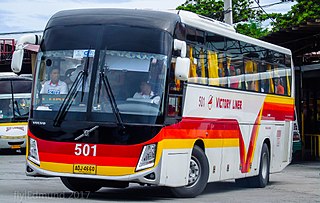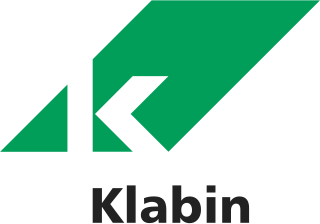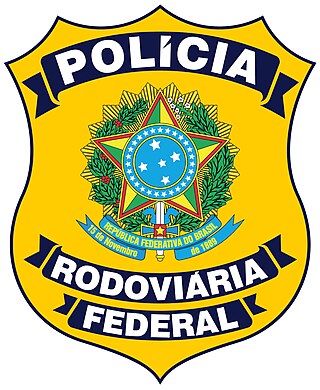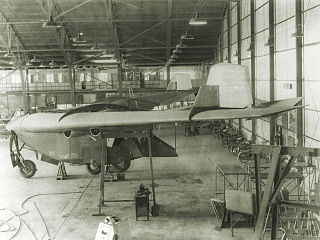
The Volvo B7R is a coach chassis available with a range of bodies. It is promoted as a rear engined lightweight coach chassis. It is primarily intended for tourist and long-distance duties. B7R is also manufactured in China, Brazil, Hungary, India and Iran for use in regional transport services.

Leopoldina is a Brazilian municipality in the state of Minas Gerais. It belongs to the Zona da Mata mesoregion and it located 322 kilometers southeast of Belo Horizonte, the state capital. In 2022, its estimated population was 51 145 inhabitants, according to IBGE. Its territory covers an area of 943 km².

Klabin is a Brazilian paper producing, exporting and recycling company headquartered in São Paulo. It is the largest paper producer and exporter in the country, focusing on the production of pulp, packaging paper and board, corrugated cardboard packaging, and industrial sacks, besides selling timber in logs. It is controlled by Klabin Irmãos & Cia and NIBLAK Participações S/A, which jointly own 52.23% of the voting capital. It is organized into four business units certified by the Forest Stewardship Council (FSC).

Joinville is the largest city in Santa Catarina, in the Southern Region of Brazil. It is the third largest municipality in the southern region of Brazil, after the much larger state capitals of Curitiba and Porto Alegre. Joinville is also a major industrial, financial and commerce center.

São Gonçalo is a municipality in Rio de Janeiro, Brazil, in the Southest region. It is located in the Metropolitan Region of Rio de Janeiro, having land limits with the municipalities of Niterói, Maricá and Itaboraí, and a maritime limit, by Guanabara Bay, with the capital, Rio de Janeiro. According to the 2022 census, it has a population of 896,744 inhabitants, making it the second most populous municipality in the state and the 18th most populous in the country.

The Brazilian Federal Highway Police is a federal highway patrol, subordinate to the Ministry of Justice, whose main function is fighting crime on Brazilian federal roads and highways, as well as monitoring and supervising vehicular traffic, although it has also taken on duties that go beyond its original authority, such as action within Brazilian cities and forests in conjunction with other public safety agencies.

José Bastos Padilha Neto is a Brazilian film director, producer and screenwriter. He is best known for directing the Brazilian critical and financial successes Elite Squad and Elite Squad: The Enemy Within and the 2014 remake of RoboCop. He has won the Golden Bear at the Berlin International Film Festival for Elite Squad in 2008. He is also the producer of the Netflix original series Narcos, starring frequent collaborator Wagner Moura, and directed the first two episodes in the series.

The DINFIA IA 38 was a 1960s Argentine four-engine experimental tailless transport aircraft, designed under the direction of Reimar Horten and based on the German Horten Ho VIII project and built by the DINFIA.
Nordic Brazilians refers to Brazilians of full or partial Nordic ancestry, or Nordic-born people residing in Brazil.

Indústria de Material Bélico do Brasil is a Ministry of Defence quango, founded in 1975, which coordinates industrial activity related to the planning and production of war material through the transfer of technology and the financial and technical support of new military development.

The history of ethanol fuel in Brazil dates from the 1970s and relates to Brazil's sugarcane-based ethanol fuel program, which allowed the country to become the world's second largest producer of ethanol, and the world's largest exporter. Several important political and technological developments led Brazil to become the world leader in the sustainable use of bioethanol, and a policy model for other developing countries in the tropical zone of Latin America, the Caribbean, and Africa. Government policies and technological advances also allowed the country to achieve a landmark in ethanol consumption, when ethanol retail sales surpassed 50% market share of the gasoline-powered vehicle fleet in early 2008. This level of ethanol fuel consumption had only been reached in Brazil once before, at the peak of the Pró-Álcool Program near the end of the 1980s.

The Brazilian automotive industry is coordinated by the Associação Nacional dos Fabricantes de Veículos Automotores (Anfavea), created in 1956, which includes automakers with factories in Brazil. Anfavea is part of the Organisation Internationale des Constructeurs d'Automobiles (OICA), based in Paris. In 2021, the annual production exceeded 2.2 million vehicles, the 8th largest in the world.

Renault do Brasil, formerly Renault do Brasil Automoveis, is the Brazilian subsidiary of the French car manufacturer Renault. It was established in 1997, and is Brazil's fifth largest automaker by sales. In 2012, Brazil was the second largest market for Renault.

The 2013 Brazilian protests were public demonstrations in several Brazilian cities, initiated mainly by the Movimento Passe Livre, a local entity that advocates for free public transportation.

The Volvo B11R is a 10.8-litre engined coach chassis available as both two- and tri-axle from Volvo since 2011. It was introduced as the second of the Volvo BXXR series, replacing the rest of the B12B range in 2011, and later its fellow BXXR platform model, the B13R in 2013.

The Volvo B12, also known as the Volvo B12R, was a rear-engined heavy-duty coach chassis manufactured by Volvo in Sweden between 1991 and 2001, and in Brazil between 1997 and 2011.
Carbuss - Indústria de Carrocerias Catarinense Ltda. is a Brazilian bus manufacturer. The company is based in Joinville in the south of Brazil, where it operates industrial premises that cover 1,000,000 m2 (11,000,000 sq ft) of land. The premises previously belonged to another bus manufacturer, Busscar, before its bankruptcy in 2012.

Companhia Carris Porto-Alegrense, also known as Carris, is one of the operating companies of Porto Alegre's public transportation, which also includes the consortiums Viva Sul, Mob, Via Leste, and Consórcio Mais. Its fleet is formed by 347 buses and serves a large part of the city, with about 30 lines.





















